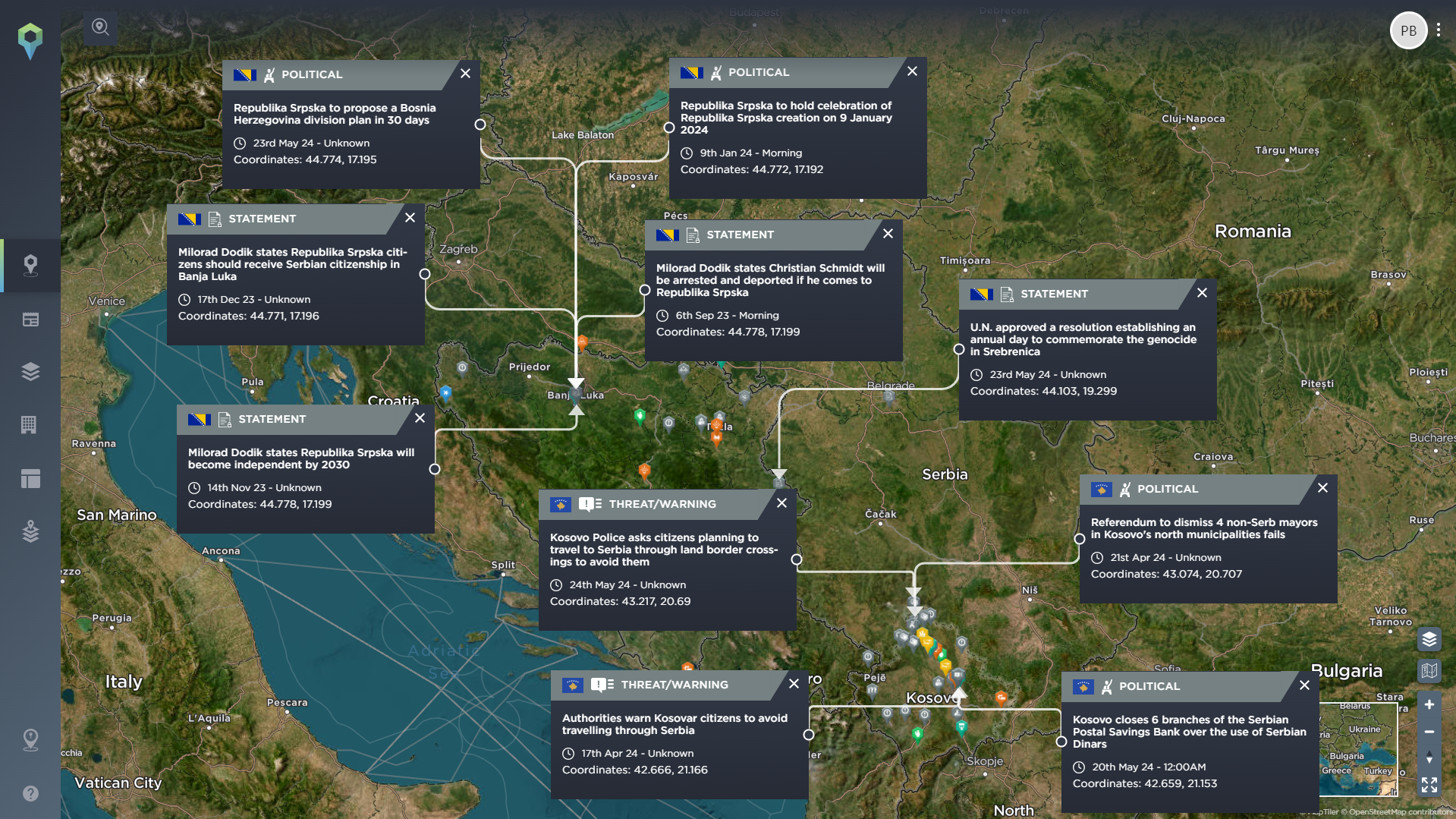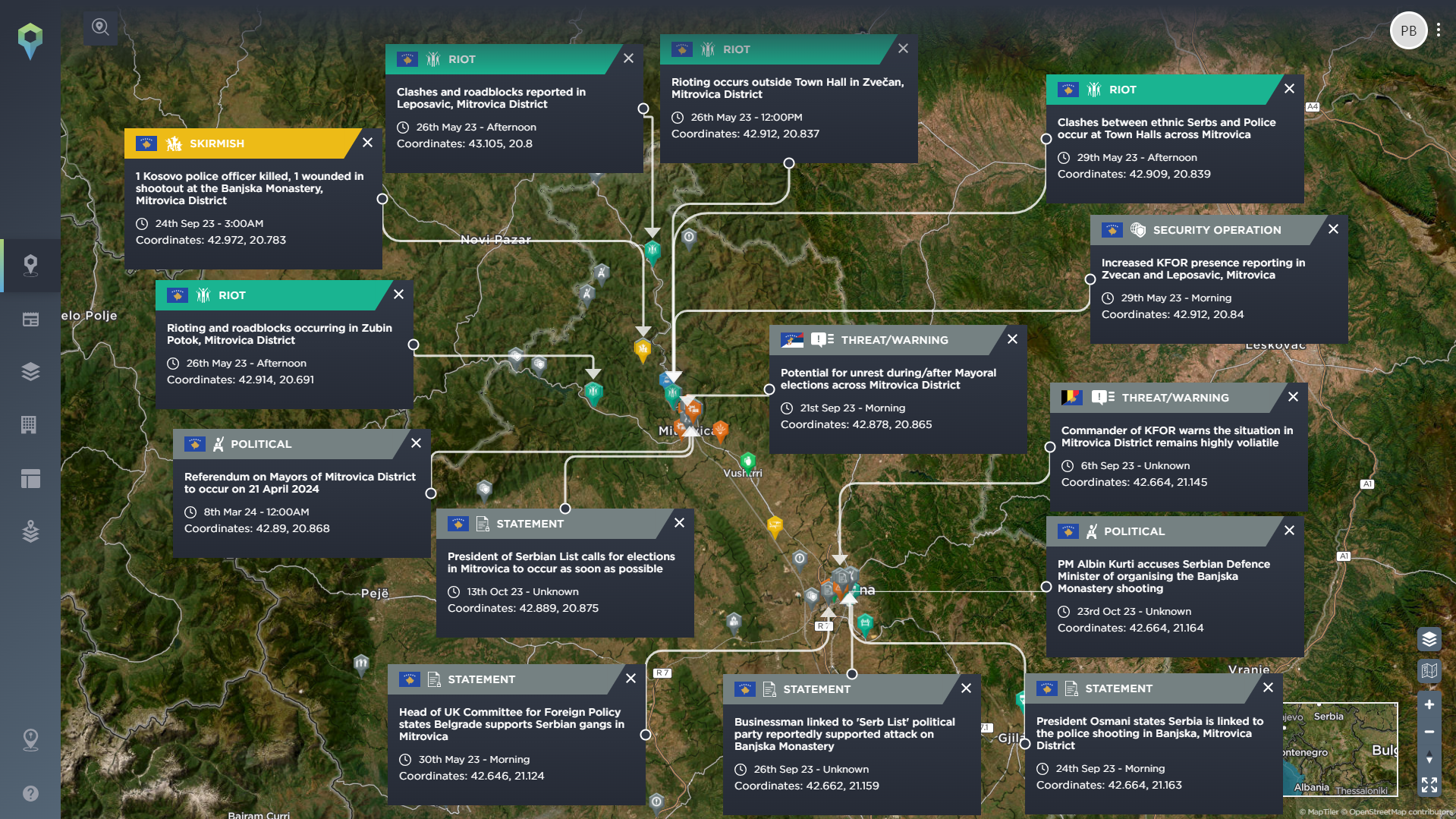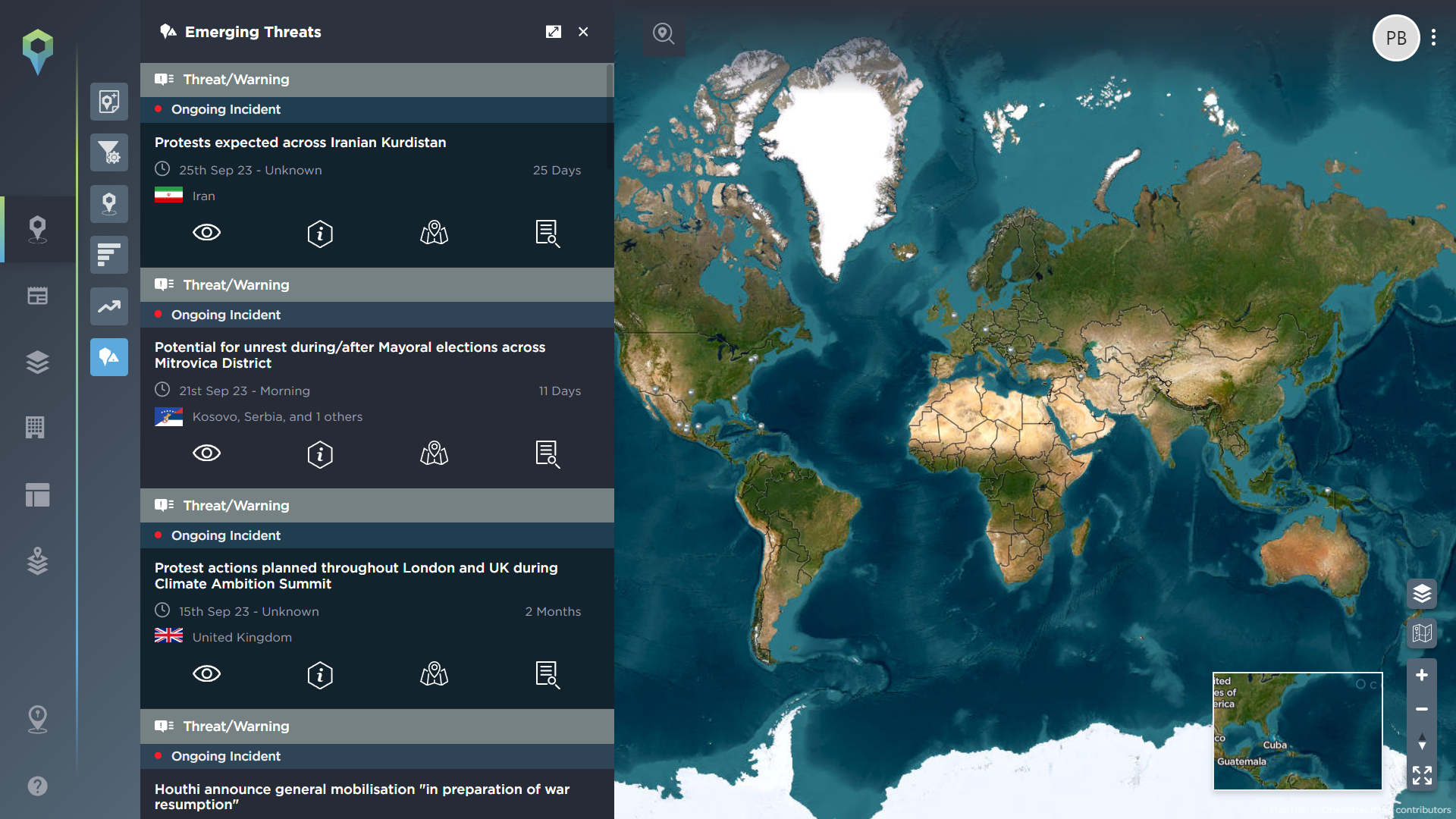Republika Srpska: Separatist threats and Balkan instability
Republika Srpska's separatist movement is the current most pressing threat in a Balkan region rife with growing tensions.
Executive Summary
- Rising threats of secessionism in the Republika Srpska, the majority Serb territory within Bosnia and Herzegovina led by President Milorad Dodik.
- The United Nations adopted UN General Assembly ‘Resolution 78/282: The International Day of Reflection and Commemoration of the 1995 Genocide in Srebrenica’, frustrating many Serbs in the region.
- Tensions surrounding the local elections in Serbia on June 2nd after the previous round of local elections in Belgrade were widely criticized for electoral irregularities.
- Increased Russian and Chinese economic and political influence in Serbia and the Republika Srpska.
- Anniversary of the clashes between (KFOR) NATO troops in Northern Kosovo serves as a stark reminder of the region’s volatility.
- Ongoing demographic and economic weakness in Serbia, Kosovo, and the wider Balkans continue to fuel discontent.

Figure one: Signs of regional, political and ethnic tensions in the West Balkans [image source: Intelligence Fusion]
Geopolitical tensions are rising in the Balkans in response to the continuing lack of perceived progress on EU membership for Serbia, Kosovo and Bosnia Herzegovina (BiH). This in conjunction with the ongoing unresolved tensions between the ethnic Serbian minorities within Kosovo, and the increasingly vociferous language from the leaders of the Republika Srpska (the Serb minority region within neighbouring Bosnia and Herzegovina), has increased instability across the region. Coupled with economic and demographic challenges, these geopolitical issues have led to increased regional tension.
The highest current tensions revolve around the Republika Srpska, the majority ethnic Serb enclave within the state of Bosnia and Herzegovina. Bosnian Serbs have adopted a more assertive and combative separatist approach since 2022, and the return of Milorad Dodik to the Presidency. Dodik was previously President of the Republika Srpska from 2010 –2018 and part of the governing triumvirate of Bosnia and Herzegovina from 2018-2022.
Republika Srpska's separatist movement
Part of Dodik’s current strategy to take steps towards Republika Srpska independence has been to repeatedly challenge the authority of the High Representative in Bosnia.
The position of High Representative for Bosnia and Herzegovina was created after the Dayton Peace Accords, ending the 1992-1995 Bosnian War, to oversee the civilian implementation of the Accords and represent the members of the Peace Implementation Council (PIC). The PIC, principally comprised of European Countries and NATO members, appoints the High Representative.
The role and duties of the High Representative were significantly expanded at the PIC meeting in Bonn in 1997. This meeting granted the High Representative: 1) the power to adopt binding decisions where the local parties seem unwilling or unable to act, and 2) the ability to remove public officials from office who violate legal commitments or the Dayton Peace Accords.
Thus far, all the High Representatives have been European with American deputies; the current High Representative is the German politician Christian Schmidt, appointed in 2021. The Office of the High Representative, and the powers bestowed upon it, remain deeply controversial both inside and outside of Bosnia Herzegovina due to the absolute veto power and the ability to overrule elected local officials. As a result, the position has often been likened more to that of a Viceroy than a democratic politician.
The Republika Srpska National Assembly passed legislation suspending rulings from the BiH Constitutional Court and stopped the publication of the High Representatives’ decisions in the official gazette. This legislation was overturned by the High Representative – however, the Republika Srpska National Assembly subsequently passed legislation effectively permitting itself to overturn the decisions of the High Representative. In summer 2023, Dodik was charged with failing to implement the decisions of the High Representative – the trial began in February 2024 and is currently ongoing. It remains unlikely that the trial will achieve anything other than strengthening Dodik’s position within Republika Srpska.
In addition to challenging the Bosnian High Representative, Dodik has voiced his ambition to hold a referendum on the independence of Republika Srpska, and proposed withdrawing from the unified Bosnia and Herzegovina armed forces, along with judicial and taxation bodies. Dodik and his allies are in favour of a fundamental dismantling of the multi-ethnic Bosnia and Herzegovina state. The most concerning issue for the regional neighbours and the wider European Union are calls from Dodik and other key figures who wish to see the reunification of the Republika Srpska with neighbouring Serbia. Although the idea of independence remains a distant prospect and the actions by Dodik remain mostly rhetorical, he has taken several actions which weaken the bonds between Republika Srpska and the central government in Sarajevo and inflame ethnic tensions.
This has included symbolically holding a Republika Srpska government meeting in Srebrenica the day after the UN General Assembly voted on the resolution marking July 11th as a day of remembrance for the Srebrenica genocide, in which Dodik called for Republika Srpska to separate from BiH. Dodik continues to deny that the actions taken at Srebrenica constituted genocide, even though BiH has a law criminalising genocide denial.
Figure three: Milorad Dodik, President of the Republika Srpska within Bosnia and Herzegovina [image source: Bloomberg]; Figure four: Christian Schmidt, High Representative for Bosnia and Herzegovina [image source: Reuters]
Russian Influence in Republika Srpska
Dodik has been vocal about the support he enjoys from both Russia and China, with both countries critical of the role of the High Representative, and both objecting to the appointment of the incumbent Christian Schmidt in 2021. The Russian Federation ceased attending meetings of the Steering Board of the PIC in 2022 and China resigned from the PIC in 2000.
Dodik was instrumental in blocking the adoption of sanctions on Russia by Bosnia Herzegovina in 2021, as any decisions require unanimity among the three BiH Presidents. However, Dodik did not object to the BiH voting in favour of resolutions criticising Russia’s actions in Ukraine; Dodik was vocally supportive of the territorial integrity of Ukraine, drawing comparisons to a future hypothetical unification of the Republika of Srpska and Serbia.
It remains to be seen how far Russian and or any Chinese diplomatic support would extend under any future confrontational circumstances. China will likely take the Russian lead over any issues in the Balkans and would be unlikely to provide much in the way of diplomatic or political support beyond supportive diplomatic statements. Russian actions are far more uncertain and the actions would depend on the nature of the dispute. Russia could move to frustrate any European action, the workings of the Peace Implementation Council, and the High Representative, as well as sowing regional discord. Russia would likely offer selective diplomatic political and financial support to neighbouring states and sympathetic ethnic or national groups with the objective of fomenting discord.
European Union engagement with Republika Srpska
The European Union has faced criticism for its ineffective response to the situation, and there is a considerable divergence of opinion among member states on how to deal with Republika Srpska. Germany and the European Parliament have called for sanctions to be imposed on Dodik’s administration, but regional neighbours including Croatia, Slovenia and Hungary all oppose the imposition of sanctions.
Dodik has threatened to declare independence if the EU imposes sanctions and stated that Republika Srpska would defend itself with its armed forces. In doing so, Dodik also claimed that he could call on unspecified ‘friends’ for support, most likely in reference to Russia. Hungary has provided financial and political support to Republika Srpska, with Prime Minister Viktor Orban visiting Republika Srpska in April 2024 and receiving the Order of the Republika Srpska directly from Dodik.
The United Kingdom and the United States have, however, imposed sanctions on Dodik and several other senior officials from Republika Srpska for undermining the state institutions of Bosnia and Herzegovina and the office of the High Representative. In response, Dodik ceased formal diplomatic contact with the UK and US embassies in Republika Srpska in March 2023. Dodik has said he would declare Republika Srpska independent if Donald Trump were elected to the US Presidency in November 2024.
Prospects for further tensions in the West Balkans
Dodik has stated the war in Ukraine has led to the postponement of any decision on the independence of the Republika of Srpska.
While the European Commission recommended the EU open accession negotiations with the Government of Bosnia and Herzegovina in March 2024, the Commission highlighted the democratic backsliding and the secessionist rhetoric from the Republika Srpska as a cause for serious concern. Dodik has said he supports the accession of Bosnia and Herzegovina to the EU, but he has also spoken positively of seeking accession to the BRICS diplomatic grouping. The prospects for BiH joining the EU within the next decade remain slight and have been damaged by Dodik’s rhetoric, although the full impact of the war in Ukraine cannot yet be fully assessed.

Tensions have spilled over into violence in Kosovo's Serb-majority Mitrovica district [image source: Intelligence Fusion]
Elsewhere in the West Balkans, Serbia has continued its long-standing policy of opposing Kosovo’s accession to any international bodies, earning a formal reprimand from the EU, and a warning that Serbia’s continuing refusal to acknowledge Kosovo’s right to join international bodies jeopardises its potential accession to the European Union. Serbia and Kosovo had previously committed to an understanding to normalise diplomatic ties in an agreement made in Ohrid, Macedonia in 2023. In this agreement, Serbia committed to cease blocking Kosovo’s entry into diplomatic institutions. As of May 2024, this has not yet been implemented in practice.
Tensions rose further after a terrorist attack in Kosovo in September 2023 which allegedly involved close associates of the sons of President Aleksandar Vucic of Serbia. Financial and currency disputes further exacerbated these tensions. In 2024 Kosovo began to enforce the use of the Euro as the main currency inside Kosovo; Kosovo has used the Euro since 2002, but the Serb-dominated areas in the north of the country continue to use Serbian Dinars. Tensions increased further after Kosovo forced the closure of six branches of the Serbian Postal Bank in May 2024 for refusing to comply with the new currency laws. The switch to Euros has been problematic for ethnic Serbs, partly due to many ethnic Serb communities relying heavily on remittance payments from families in Serbia in Serbian Dinars.
Ongoing demographic and economic decline across the Balkan region is especially prominent in Serbia and Kosovo. The population of Serbia is expected to shrink by approximately 15% by 2050, and in the decade up to 2010 Bosnia and Herzegovina lost 20% of its population. A combination of lower total fertility and high emigration affects all countries in the region. The combination of economic and demographic decline will reduce Serbia’s ability to provide additional funding and support for Republika Srpska, while simultaneously Republika Srpska will seek to ameliorate its economic and demographic weakness by seeking closer ties to Serbia. Kosovo will also struggle to maintain its freedom of action without EU membership, given Serbia’s willingness to continually frustrate many of Kosovo’s actions in terms of logistics, trade policy, international groupings, and professional bodies.
May 2024 marked the first anniversary of clashes between NATO KFOR troops and Serbian protesters in the North of Kosovo which left twenty-five peacekeepers injured. The dispute was sparked after Kosovo decided to force access into municipal buildings in northern Kosovo. As a result of the tensions over the forced adoption of the Euro and the closure of Serbian banks in the north of Kosovo, a repeat of clashes between protesters cannot be ruled out.
The situation in Republika Srpska and the wider Balkans poses a risk not just to regional stability, but to broader geopolitical tensions, too. It encompasses issues such as EU accession and internal disagreements, EU and US sanctions, and Russian influence and disruption, at a time when Western attention and resources are occupied elsewhere. Should tensions continue to escalate, this could impact markets and security beyond the region.
Intelligence Fusion are specialists in mitigating operational risk and security threats by providing timely, accurate and actionable intelligence from across the globe. As part of the Sigma7 group, we help businesses maintain operational integrity across their entire organisation, transforming the industry with a client-led end-to-end risk model.
To learn more about our threat intelligence platform, and how we can work with your organisation, reach out to a member of the team now.



